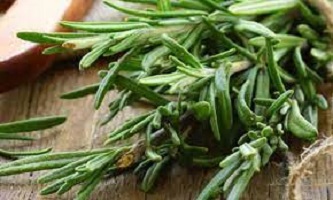Rosemary: Benefits, Uses, Side Effects, and More
Rosemary: Benefits, Uses, Side Effects, and More
The rosemary, or Rosmarinus officinalis as it is scientifically known, is derived from the Latin words ros (“dew”) and marinus (“belonging to the sea”)

The sea-blue blossoms of rosemary may have been a factor in the name’s etymology.
In several languages, rosemary is known by a variety of names, including mi die xiang (Mandarin Chinese), rosmarino (Italian), romero/rosmario (Spanish), romarin (French), and ikleel al-jabal (Arabic) (German)
Its strong scent distinguishes it from other species of its kind making it easily identifiable.
Chefs and home cooks all over the world are familiar with the pungent, woodsy aroma of dried rosemary, but this culinary herb has a long history of medical and spiritual benefits in addition to its use in chicken dishes, soups, spreads, and teas.
What is Rosemary? Rosemarys Meaning
Rosemary is an aromatic evergreen herb native to the Mediterranean.
It is utilized as a culinary condiment, to make bodily perfumes, and for its latent health benefits.
It is a member of the mint family Lamiaceae, along with many other herbs, such as oregano, thyme, basil, and lavender.
Rosemary leaves can be used in cooking whole or crushed; fresh or dried and it contains 1 to 2.5% essential oils.
The rosemary plant is perennial (it can live for three or more years).
Rosemary is known for its distinguishing woody stems with its needle-like leaves and evergreen scent, which is present in the oil inside the herb’s dark green needles, rosemary is a member of the mint family of plants (also known as Lamiaceae).
What is the Origin of Rosemary?
The earliest known users of rosemary were the ancient Egyptians, who are said to have offered 125 measures of the herb to the god Amon at Thebes.
Nutritional Value of Rosemary ~ Does Dried Rosemary Have Nutritional Value?
Rosemary is high in Manganese, a vital nutrient for metabolic health. Manganese also helps the body to form blood clots, allowing injuries to heal faster.
Rosemary contains carnosic acid, a compound known for its powerful antioxidant properties
It is also a good source of Vitamin A, Thiamin, and Magnesium, and a very good source of Dietary Fiber, Vitamin C, Vitamin B6, Folate, Calcium, Iron, and Manganese.
What are the Uses and Health Benefits of Rosemary?
In many western nations, particularly in Italy and Southern France, rosemary is used as a spice in a wide range of foods, although it is scarcely used in Asian cuisines, it is used t make soups, and casseroles, salads, and stews.
Rosemary can be dried and made into scented drawer sachets, used as an ingredient in homemade soap, turned into fragranced water that makes your hair shiny and soft, and more.
You can also simply brush against your rosemary plant to experience a fresh burst of its uplifting scent.
Rosemary herb extractions are known to stimulate hair follicles and help prevent early baldness when applied to the scalp.
It serves as an effective therapy for dandruff and scurf prevention. Rosemary is used to making essential oil and also rosemary tea which in turn offer some health benefits which are listed below:
- Medicinal uses of Rosemary
- Researchers have discovered that the natural polyphenolic antioxidant; rosmarinic acid, which is present in rosemary, possesses antibacterial, anti-inflammatory, and antioxidant properties.
- Camphene, cineol, borneol, bornyl acetate, and other volatile essential oils are discovered in rosemary oil that is extracted from the floral tops.
- Rosemary herbal oil is also administered directly as patients recover to relieve the discomfort of neuralgic, gout, and rheumatic disorders.
- Rosemary tea is a natural treatment for nervous headaches, colds, and sadness
- Certain phytochemicals (plant-derived) chemicals can be found in rosemary leaves that can promte health as well as prevent diseases.
- The herb components, particularly the flower tips, contain the phenolic antioxidant rosmarinic acid.
- Rosemary leaves have no cholesterol and 131 calories per 100 g. In addition to minerals, this common herb also contains notable non-nutrients including dietary fiber (37 percent of RDA).
- The herb is particularly abundant in several B-complex vitamin subgroups, including folic acid, pantothenic acid, pyridoxine, and riboflavin. It is one of the herbs with a lot of folates; it provides about 109 g per serving.
- Rosemary has a significant quantity of vitamin A, 2924 IU or 97 percent of RDA, per 100 g. A few leaves per day would provide enough of this vitamin in the diet.
- Rosemary leaf is rich in Vitamin A which is important for vision and is reported to have antioxidant effects.
- Fresh rosemary leaves provide about 22 mg of the antioxidant vitamin, vitamin C, per 100 g, or about 37% of the RDA.
- Regular consumption of foods high in vitamin C enhances immunity and prevents the body from becoming scurvy, and aids in the removal of damaging, pro-inflammatory free radicals from the body.
- Whether used fresh or dried, rosemary herb components are a great source of potassium, calcium, iron, manganese, copper, and magnesium.
- The herb has 6.65 mg of iron per 100 g of fresh leaves, making it a superb source of iron (about 83 percent of RDA).
- Rosemary seeds benefits ~ Rosemary seed is a rich source of antioxidants and anti-inflammatory compounds, which are thought to help boost the immune system and improve blood circulation.
Below are some common rosemary recipes:
- Rosemary tea
- Rosemary Spiced Nut Recipe
- Rack of Lamb with Rosemary
- Rosemary Chicken
- Rosemary Roast Potatoes
- Rosemary Oil
How to Plant Rosemary
Rosemary is typically not difficult to grow, and once it has rooted itself, this woody perennial shrub will flourish for years.
How to Take Care
Firstly, water rosemary plants evenly throughout the growing season, but be careful not to overwater.
The rose plant doesn’t often need fertilizer, but if the plant looks small or growth seems slow, fertilize with a balanced, all-purpose fertilizer in the spring before new growth appears.
How to Harvest Rosemary
Harvest by snipping sprigs with pruners or kitchen scissors. The new growth will be flexible and lighter green whereas older growth will be woodier and darker.
Either is fine to use but new growth can be more fragrant and easier to chop
What are the Side Effects of Using Rosemary Plant?
Side effects include:
- Consistent consumption of large amounts might cause irritation to the stomach and intestines as well as kidney damage.
- Seizures
- Toxicity
- Comas
- A rise of fluid in the lungs (pulmonary edema)
- Increases menstrual bleeding
- Could result in miscarriage
FAQs
What is rosemary spice used for?
Since ancient times, the herb has been recognized for its therapeutic qualities.
Rosemary has long been used to ease musculoskeletal discomfort, enhance memory, strengthen the immune and circulatory systems, and encourage hair development.
How do I make rosemary tea?
Rinse the rosemary leaves properly. Place the boiling water in a mug with the rosemary sprigs inside. Give the herbs five minutes to steep.
(An alternative method: Chop the rosemary leaves and put them in a tea strainer before steeping if you’d like.)
How do you make rosemary oil at home?
Instructions:
- Firstly, gather enough fresh rosemary to fill your Mason jar
- Secondly, place the clean rosemary inside the empty Mason jar.
- Olive oil should thoroughly cover the rosemary in the jar.
- After that, place the jar in a window with sunlight for about a month,
- Lastly, empty the infused oil into a fresh container.
Rosemary spices ~ what does the spice rosemary taste like?
What Does Rosemary Taste Like? There is no flavor quite similar to rosemary. This woodsy aromatic herb has notes of evergreen, pine, sage, citrus, lavender, pepper, mint, and sage.
How can I make rosemary oil quickly?
Firstly, heat a few fresh rosemary sprigs in your preferred oil to make rosemary oil rapidly.
But think that this oil needs to be utilized right away or it can go sour.
Finally, use dried rosemary as an alternative to making oil with a longer shelf life.
How does rosemary oil work on the skin?
When smeared, rosemary essential oil totally cleans your skin and upholds healing, leaving your skin feeling more revitalized than ever.
Detoxify: Rosemary oil helps in eliminating toxins from the skin by boosting lymphatic drainage and circulation.
Can you apply rosemary oil directly to your skin?
Rosemary oil can be heated or used externally. A diffuser can aid in spreading the essential oil around a space.
To prevent skin irritation when applying rosemary oil directly, dilute it with a carrier oil, such as jojoba oil.
How do you use rosemary in food?
Stews and meat recipes can taste better with the use of whole rosemary sprigs.
The most popular use for rosemary is to season meat, particularly lamb, pork, and chicken.
Bread or biscuit dough can be seasoned by adding chopped rosemary, which will saturate the entire food while cooking.
Rosemary goes nicely with potatoes, beans, and lentils as well.
Who should not take the Spice/Herb
Rosemary may have an impact on blood clotting. Any blood-thinning medications you are taking could be altered, including Clopidogrel, Coumadin, and Warfarin (Plavix).
Does rosemary make you sleepy?
Rosemary leaves may motivate you. In traditional medicine, rosemary oil is frequently used to treat mental weariness and strain (26).
Twenty healthy young individuals reported feeling 25% less sleepy and 30% more mentally alert after inhaling rosemary oil than after inhaling a placebo.
Can rosemary raise blood pressure?
The results are supported by a prior massage study using rosemary oil, which revealed that rosemary oil raised blood pressure and respiration rates.
What tastes better thyme or rosemary?
Rosemary is a potent plant that is pungent and slightly bitter, whilst thyme has a strong herbal aroma with crisp grass, wood, and floral overtones. In a nutshell, rosemary tastes stronger than thyme.
Do you put rosemary or thyme on steak?
Although both rosemary and thyme are excellent for seasoning meat, rosemary is preferable for steak and thyme is ideal for seasoning soups and stews.
Is parsley similar to rosemary?
Parsley is spicy and fresh, and its subtle perfume will make you think of lettuce and anise.
It gives a little crunch to your foods and is rather delicate, sweet, and fresh.
Add parsley at the end of cooking to replace the rosemary.
Substitute for rosemary ~ Best substitute for rosemary
- Thyme (fresh or dried, including garnishes). Thyme can work as a substitute for rosemary, though its flavor is much milder
- Sage (fresh or dried, including garnishes). Sage is a nice substitute for rosemary because they both have a pine-like flavor.
- Marjoram or savory (dried).
Rosemary oil for hair~ how often should I put rosemary oil in my hair for hair growth?
Rosemary oil is most active for hair restoration when used steadily for at least 6 months.
You can also use treatments a minimum of 1 to 2 times per week.
How to use rosemary oil in your hair
- Massage, rinse, repeat
- Remix your rosemary
- DIY your shampoo
Can dogs eat rosemary?
Overall, dogs can eat small amounts of rosemary. Diced-up dried or fresh rosemary is safe to add to your dog’s food or water and can help aid heart health and digestion
What is rosemary water good for?
Rosemary is a strong antioxidant, which offers skincare anti-aging properties.
Moreover, it will aid prevent damage to your skin from environmental agents.
Thanks to its stimulating result in improving circulation, rosemary water will lessen puffiness by eliminating excess water from the skin tissues.
Is Rosemary Shampoo good for hair?
Answer: Yes, rosemary shampoo is beneficial for your hair for the reason that this natural herb encourages hair growth, controls hair fall, and aids with faster hair regrowth.
Can you eat rosemary raw?
Rosemary is often seen in meals. When taken as a medicine for up to 4 weeks, rosemary leaf may be safe for the majority of people.
However, it is probably dangerous to consume rosemary leaves in very big doses of in undiluted rosemary oil.
What fruit goes well with rosemary?
- Citrus fruits.
- Grapes
- Pineapple
- Cranberries
- Apples
- Kiwis
Can you eat cooked rosemary?
Full rosemary sprigs are excellent for garnishing, finishing, and enhancing some foods, roasts, soups, and other dishes can be cooked using whole sprigs of rosemary, or you can add the sprigs after cooking to embellish a dish.
Can I boil rosemary and drink it?
Use a mesh strainer with tiny holes to extract the rosemary leaves from the boiling water, or take them out of the tea infuser.
The used rosemary leaves are suitable for disposal. Fill a mug with your rosemary tea and sip it. If you’d like, you can add a sweetener, such as sugar, honey, or agave syrup.
Is rosemary good for kidneys?
As a result of rosemary’s ability to prevent or lessen the severity of DEN-induced kidney impairment, rosemary is best recommended for usage as a nutraceutical or dietary supplement.
Can you drink rosemary tea every day?
Rosemary tea is caffeine-free; it can be sipped all day long.
A strong pine aroma is present in rosemary tea, while overtones of lemon and mint are also present. This tea has a stimulating pine aroma that is both crisp and fragrant.
What does rosemary do to your brain?
It might just have similar effects to medications approved for treating dementia by raising the neurotransmitter acetylcholine.
Is rosemary good before bed?
In contrast to some herbs, rosemary actually stimulates clear dreams.
What is the best way to take rosemary?
As a tonic and as a bitter, it aids in the digestion of great proteins like those in meat, dairy, and grains.
A cup of rosemary tea right before or right after a meal will be of great benefit to anyone who experiences bloating, blood sugar problems, gas, or pain in their digestive system.
Rosemary and thyme ~ what are Rosemary and Thyme good for?
Nutrition. Together rosemary and thyme deliver on the nutritional front: A teaspoon of ground thyme is a good source of calcium, potassium, magnesium, phosphorus, iron, and Vitamin A.
A teaspoon of dried rosemary does all that, and adds magnesium and Vitamin C! Rosemary also delivers on the polyphenol/antioxidant front.
Rosemary for hair growth – Can rosemary stimulate hair growth?
The Rosemary essential oil
if you want to improve hair thickness and hair growth, rosemary oil is a great choice thanks to its capacity to increase cellular generation.
According to one study, rosemary oil performed as well as minoxidil, a popular hair growth treatment, but with less scalp itching as a side effect.
Does rosemary keep you awake?
Research examining the influence of rosemary on the body found that it stimulated the body.
For example, a study on work performance and stress found that rosemary essential oil improved alertness and concentration.
Are rosemary and oregano the same?
Dried oregano tastes great sprinkled on vegetables, added to pasta meals, stews, soups, tomato recipes, vinaigrettes, and sauces.
Rosemary: It tastes strongly of wood. Because a little goes a long way, use it sparingly. It works great in marinades, soups, and dishes with chicken, pork, and lamb.
What does rosemary do to steak?
Through the inhibition of toxin production, marinating reduces danger. But rosemary is one component that significantly alters the outcome.
It dramatically decreases heterocyclic amines when added to ground beef and other types of muscle meat before grilling, frying, broiling, or barbecuing, according to studies.
Which is healthier rosemary or thyme?
Thyme has more protein and carbohydrates than rosemary, which has more calories and fats.
The majority of minerals and vitamins, especially vitamins C, B2, and iron, are also more abundant in thyme. But rosemary has far greater folate content.
What is the difference between rosemary and basil?
Herbs include dill, parsley, rosemary, basil, and parsley. Keep in mind that the herb in each of these cases is a plant’s green or leafy portion.
While the leaves of rosemary resemble the spines of an evergreen plant, those of basil can grow to be fairly enormous.
How do you cook with rosemary and thyme?
Whole leaves of thyme will add layers of spice to sauces, beans, soups, and stews (remove before serving).
Try slicing rosemary finely and combining it with garlic, salt, or lemon zest because rosemary tends to be stronger. Rosemary goes well with fat, which is why roasted meats and olive oil go well together.
Can you use rosemary and thyme together?
Thyme is excellent for marinades and the majority of meat recipes because of its sweet, nutty, and mildly peppery flavor.
Basil, chives, oregano, parsley, rosemary, sage, and tarragon complement it wonderfully.
How do you lose weight with rosemary?
Tea and detox water are two different methods to consume rosemary for weight loss.
The steps are:
- Firstly, put boiling water in a cup.
- Then, wash the fresh rosemary leaves and then soak them in the hot water.
- After that, add honey and the ginger that has already been crushed.
- Lastly, before sipping on the rosemary tea, let the mixture settle for a few minutes.
Should I Use Fresh or Dry Rosemary
You decide! The fragrance of fresh and dried rosemary is nearly identical.
Conclusion
Rosemary is, without doubt, one of the most special and versatile culinary herbs owing to its vast medicinal, aesthetical and culinary advantages.
Although it is scarcely used in Asian Cuisines it is used greatly in Italy and Southern France.
How much of it is safe to use varies from person to person but can be controlled according to the recommendation.
The rosemary essential oil and tea also should be used moderately.


